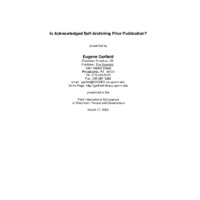Is Acknowledged Self-Archiving Prior Publication?
Metadata
Is Acknowledged Self-Archiving Prior Publication?
""Prior"" distribution increases critical refereeing by peers which improves the quality of what gets published. With rare exceptions, none of the new methods for providing ""prior"" exposure are all that efficient. They reach a fraction of the audience. I believe ""original"" or formal publication has significance only in the context of mass-distribution journals. If a journal publishes an article, and readers were not previously aware of the information it reported, and the author states openly that the ideas have been exposed on the Web, does this affect the value of that information to the reader? I've often encountered articles and books in which the author mentions earlier work with which I was not familiar. If the ideas are new to me, does it matter that it is not the place in which the idea was first expressed? Some degree of redundancy is essential to the dissemination of new ideas because there are so many new ideas competing for our attention. Here's what I advised journal editors. If a paper meets your criteria for excellence, and if your readers will benefit from reading those ideas, do not be put off by the fact that the author has discussed those ideas in an open forum--whether on the Web or at a meeting, or even in the lay press. Make authors acknowledge, by suitable references where the work has been reported before. This will ""protect"" the small number of readers who may have heard the paper at a meeting from double exposure. The ethical issue is not whether the ideas are completely new, but whether the author has acknowledged the earlier exposure. Appropriate references preserve the historical record. Traditional publishers who generate income from print journals will rationalize their need to continue the status quo but even the most conservative will eventually incorporate electronic publication. Unfortunately, librarians will have to deal with the added complexity of the infinite variety of combinations of publishing practices. New tools will tell us where to find an electronic alternative to print. Electronic publications are so pervasive that it is difficult to enforce Ingelfinger rules. So if ACS or other publishers will not permit me to publish a paper I've self-archived, they will lose submissions to competitors who do. Posting and sharing one's preliminary publications are an important part of the peer refereeing review process and does not justify an embargo by publisher's on the grounds of ""prior publication."" It was not the case with preprints before the Internet, and except for unusual clinical situations, has not changed because we have the Internet.
2000


